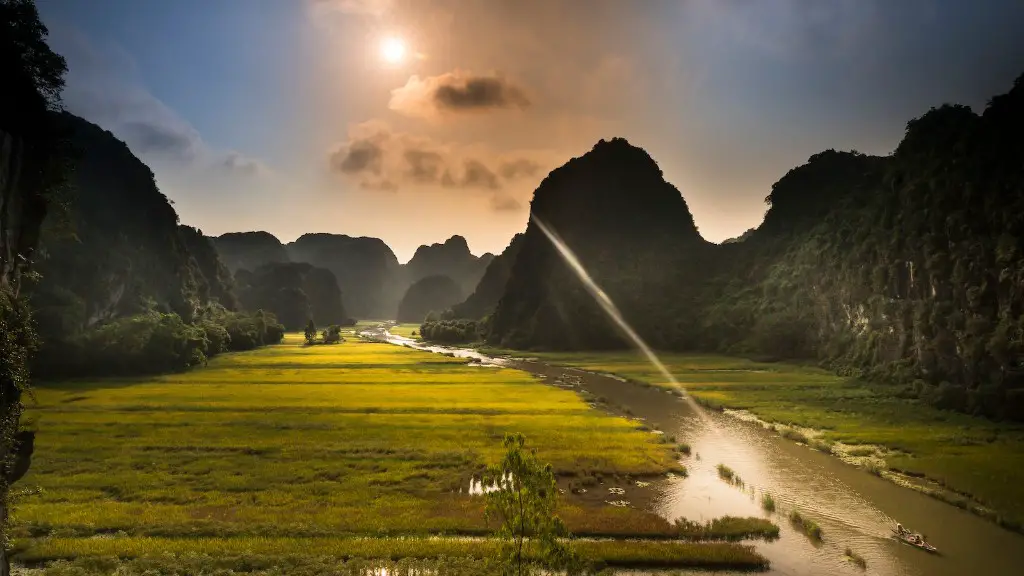Nile River in Ancient Egypt
The Nile River is the longest river in the world, and has been an integral part of life in Ancient Egypt for thousands of years. The Nile was the lifeblood of Ancient Egyptian civilization and the basis for their success. The river was the source of water, used for both practical and ceremonial purposes, and helped sustain the crops they grew which fed their population.
The yearly flooding of the Nile river made the area around it a lush paradise full of wildlife, food, and fish. This abundance of resources helped fuel the growth of the Egyptian culture, as Ancient Egyptians developed new methods of farming, fishing, and herding along the banks of the river. The flooding of the Nile was even worshipped as a god, known as Hapi, and was known to bring fertility and good fortune.
The Nile river was also used as a source of transportation in Ancient Egypt. Its slow-moving waters ferried boats of all kinds downriver, allowing for trade between the many settlements along its banks. The Nile was also used for battles and invasions, with larger stern-drive boats carrying soldiers upstream, and sailing vessels bringing them back down.
The river even played a role in religion, as Ancient Egyptians believed that the Nile flowed into the Underworld where their gods lived. The Nile was also essential to their intricate irrigation system, diverting the river’s water to canals and then flooding the surrounding fields to promote crop growth.
Archaeologists and historians believe that the Ancient Egyptians would have been unable to survive without the Nile. The river’s plentiful resources and ability to be used for transportation and irrigation systems were paramount to their success, allowing them to build the iconic structures such as the Great Pyramids of Giza that have become synonymous with Ancient Egypt.
Social and Economic Effects of the Nile
The Nile was of great importance in Ancient Egypt. Socially, it was a source of water and food, as well as a place of recreation and leisure, while its waters were used to transport goods throughout the country. Economically, the river provided the resources and waterways that allowed for trade and commerce to flourish.
The Nile was a key factor in the success of the Ancient Egyptian economy. Its floods provided water and fertilizer to the soil, which helped increase crop yields and supported a larger population. The river’s waters were also used for fishing, and the transportation of goods and people throughout the region. This allowed for greater access to resources and the flow of goods, which led to increased wealth and prosperity.
The Nile also played an important role in Ancient Egyptian politics and economy, connecting the many settlements along its banks. Its importance in trade and commerce was recognized and respected, with Ancient Egyptians building monuments and imposing strict taxes on the movement of goods. This taxation allowed the government to collect revenue and help maintain order, and contributed to the economic success of the time.
Environmental Impact of the Nile
The Nile River had a significant environmental impact on Ancient Egypt. The regular flooding of the river brought rich soils and nutrients to the area, making it an ideal environment for agriculture. It also provided valuable habitat for many species of plants and animals, and helped support a diverse ecosystem.
The Nile’s role in agriculture had both positive and negative impacts on the environment. On one hand, it allowed Ancient Egyptians to grow a variety of crops and increase their food supply. On the other hand, it caused soil erosion and siltation, as well as over-farming of the land, which deplete the soil of its nutrient content.
The Nile’s waters also housed a large variety of species of fish, which served as a major source of food for Ancient Egyptians. Unfortunately, overfishing of the river led to decreased fish populations, which had a negative impact on the environment.
Cultural Significance of the Nile
The Nile holds an immense amount of cultural significance for Ancient Egyptians, and it is celebrated in many of their artwork and literature. The river is often depicted in hieroglyphs, and it is seen as a symbol of life and fertility. Songs, prayers, and even gods were dedicated to the river, which was praised for its ability to provide sustenance and wealth to the people.
The river was also a source of entertainment and leisure, and many of the Ancient Egyptian gods were closely associated with it. Fairs were held along the banks, and people would often bathe in the river or engage in festive activities such as boat racing.
These traditions were passed down and are still celebrated to this day. The Nile is an integral part of the modern Egyptian culture and identity, and is still an important resource for the country, providing water for millions of people, and a home for countless species of birds, fish, and other animals.
Religious Significance of the Nile
The Nile was of immense religious significance to Ancient Egyptians. Their gods were closely associated with the river, and it was believed to be the source of many of the natural phenomena associated with it, such as the annual flooding. The river was even worshipped as a god in its own right, known as Hapi, who was thought to bring good fortune and fertility.
The Nile was also believed to be the gateway to the Underworld, where Ancient Egyptians believed their gods lived. The river was of immense spiritual importance, and was even seen as a symbol of strength and eternity in many of their artwork and literature.
Conclusion
The Nile has been of great importance to the Ancient Egyptians for thousands of years, providing them with sustenance, transportation, and leisure activities. It was also of great religious significance, worshiped as a god and believed to be the gateway to the Underworld. The Nile was a key part of Ancient Egyptian culture, and its significance can still be felt in modern-day Egypt.

